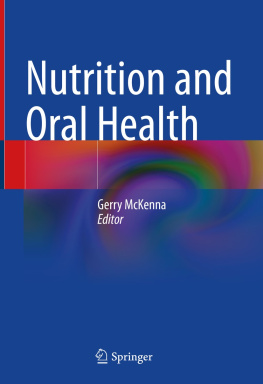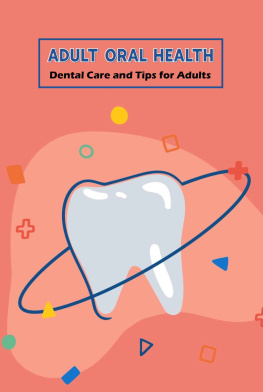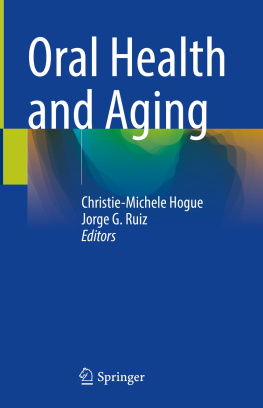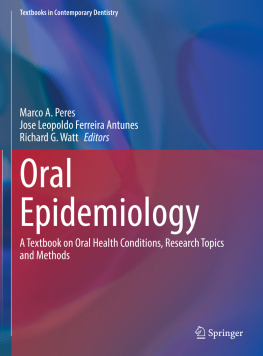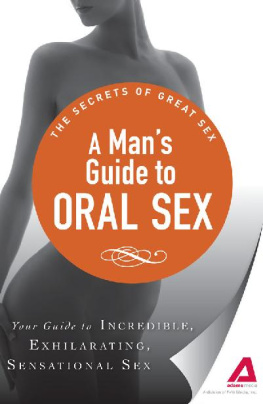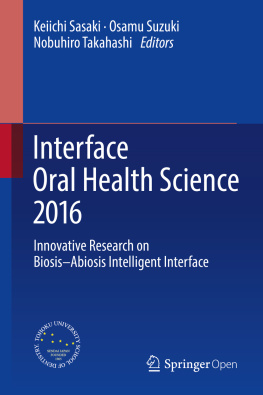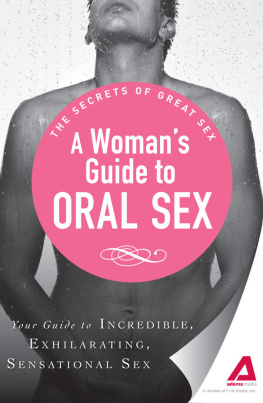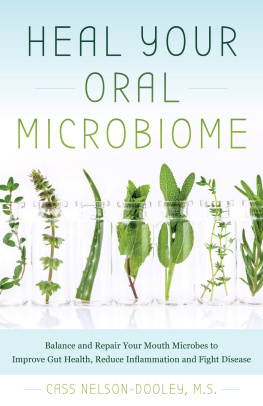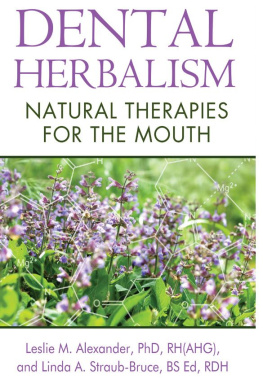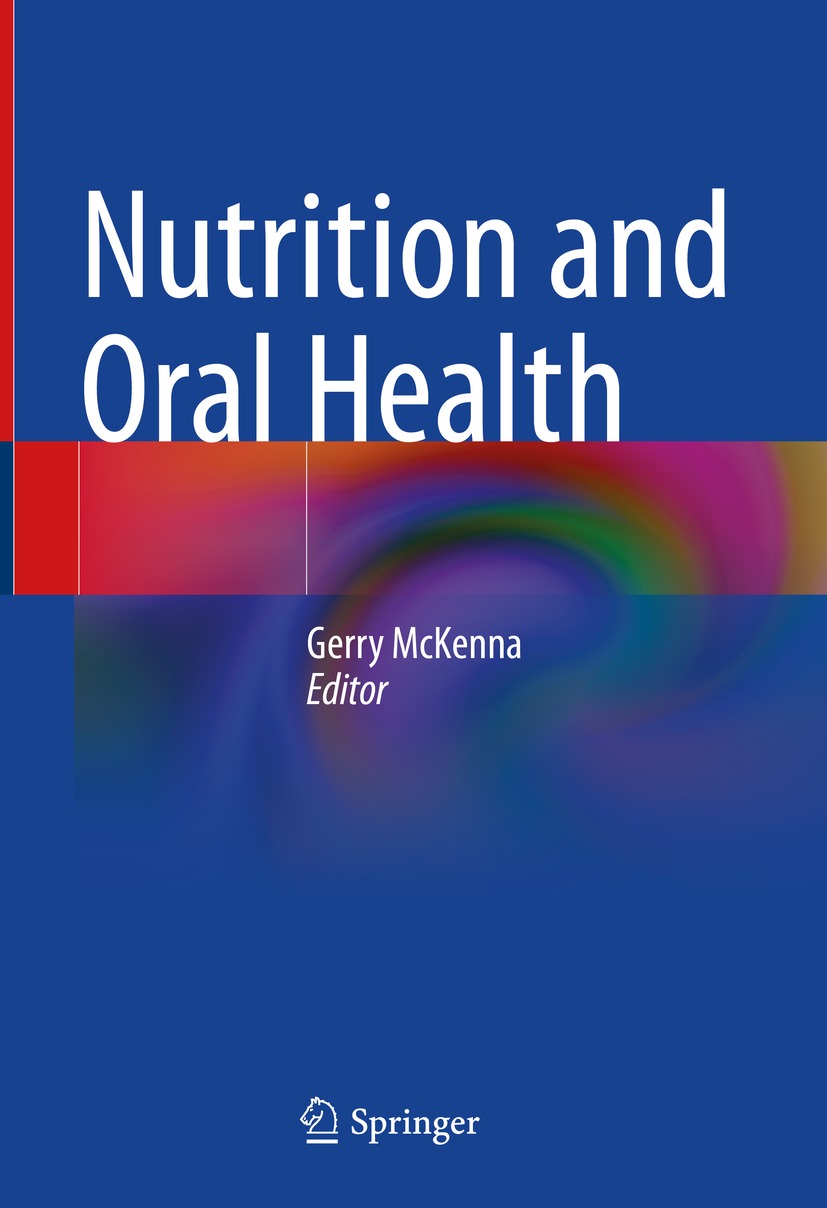Nutrition and Oral Health
1st ed. 2021

Logo of the publisher
Editor
Gerry McKenna
Centre for Public Health, School of Medicine, Dentistry and Biomedical Sciences, Queens University Belfast, Belfast, UK
ISBN 978-3-030-80525-8 e-ISBN 978-3-030-80526-5
https://doi.org/10.1007/978-3-030-80526-5
Springer Nature Switzerland AG 2021
This work is subject to copyright. All rights are reserved by the Publisher, whether the whole or part of the material is concerned, specifically the rights of translation, reprinting, reuse of illustrations, recitation, broadcasting, reproduction on microfilms or in any other physical way, and transmission or information storage and retrieval, electronic adaptation, computer software, or by similar or dissimilar methodology now known or hereafter developed.
The use of general descriptive names, registered names, trademarks, service marks, etc. in this publication does not imply, even in the absence of a specific statement, that such names are exempt from the relevant protective laws and regulations and therefore free for general use.
The publisher, the authors and the editors are safe to assume that the advice and information in this book are believed to be true and accurate at the date of publication. Neither the publisher nor the authors or the editors give a warranty, expressed or implied, with respect to the material contained herein or for any errors or omissions that may have been made. The publisher remains neutral with regard to jurisdictional claims in published maps and institutional affiliations.
This Springer imprint is published by the registered company Springer Nature Switzerland AG
The registered company address is: Gewerbestrasse 11, 6330 Cham, Switzerland
Contents
Gerry McKenna
Ciaran G. Forde , Michelle C. McKinley , Jayne V. Woodside and Anne P. Nugent
Joanna May
Gerry McKenna , Murali Srinivasan , Claudio Leles and Martin Schimmel
Jayne V. Woodside , Sara M. Wallace , Michelle C. McKinley , Anne P. Nugent and Gerry McKenna
Lewis Winning and Ciarn Moore
Martina Hayes , Cristiane da Mata , Francis Burke and Gerry McKenna
Laura McGowan
Springer Nature Switzerland AG 2021
G. McKenna (ed.) Nutrition and Oral Health https://doi.org/10.1007/978-3-030-80526-5_1
1. Introduction
Gerry McKenna
(1)
Centre for Public Health, School of Medicine, Dentistry and Biomedical Sciences, Queens University Belfast, Belfast, United Kingdom
Abstract
Good-quality nutrition is extremely important for everyone through their life course as it drives growth and development in children and helps prevent many systemic diseases in adults and malnutrition in older adults. Whilst a series of complex and interconnected factors play a role in dietary intake and nutrition, oral health is an important consideration, particularly the maintenance and retention of natural teeth as people age. This book will detail the relationship between oral health and nutrition, with a focus on the extremes of age, by referencing relevant scientific literature and discussing guidance produced by government and public health bodies.
Keywords
Children Adults Older adults Oral health Nutrition Diet
A healthy diet is essential for good health and nutrition at all stages of life as it protects against many chronic non-communicable diseases. Eating a variety of foods and consuming less salt, sugars and saturated and industrially produced trans fats are essential for a healthy diet. A healthy diet comprises a combination of different foods including staples like cereals or starchy tubers; legumes; fruits and vegetables; and proteins from animal sources [].
Unfortunately, diets are suboptimal for health amongst both adults and children globally. In high-income societies in particular, there is an overconsumption of foods high in fat, salt and sugar, coupled with inadequate intakes of fibre, wholegrains, fruits and vegetables, and fish. Linked to poor-quality dietary intake, there has also been a significant increase in levels of obesity, with rates tripling in adults in the United Kingdom in the past 20 years []. Significant advances have been made in the field of behavioural science in the past decade, with a greater shared understanding of the important strategies and techniques which can be used in the design of interventions to change dietary behaviour.
Amongst the complex factors which influence diet and nutritional status, oral health plays an important role. The presence of natural teeth is essential to facilitate mastication, directly impacting nutritional status. The importance of good oral health to facilitate dietary intake is observed most acutely at the extremes of age. Children and adolescents have high nutritional requirements relative to their size in order to meet demands for growth, development and physical activity. Dietary habits established in childhood will influence systemic health across the life course. Good nutritional status and good oral health are interconnected; good nutrition is essential for optimal growth, development and maintenance of all tissues and organs in the body, including the oral cavity. Poor or inadequate dietary habits can negatively impact oral health, whilst oral health issues can lead to inadequate nutritional intakes impacting on weight gain and growth.
In older adults, losing natural teeth can impact on masticatory function making it more difficult to chew certain types of foods, such as raw vegetables and fruits as well as some sources of protein. This often leads to a change in food consumption, with an increase in the intake of softer, more processed foods which are low in nutrients and fibre but high in calories [].
This book is designed to describe the interrelationship between oral health and nutrition. Given this broad subject, we have focused on children and older adults where clear evidence is available to describe these relationships. For oral health clinicians it is hoped that this information can help inform preventative and operative treatment planning which includes an appreciation of nutrition and dietary intake. For other healthcare professionals it is hoped that this book will help to reinforce the importance of good oral health for management and prevention of systemic diseases particularly in relation to nutrition. To summarise we should remember the position statement of the American Dietetic Association who stated:
Nutrition and oral health are inextricably linked. Poor oral health can affect an individuals ability to eat certain nutritious foods while poor nutrition can increase an individuals risk of poor oral health including periodontal disease and tooth loss [].
References
Healthy Diet Fact Sheet. World Health Organization: https://www.who.int/initiatives/behealthy/healthy-diet
Scheelbeek PFD, Cornelsen L, Marteau TM, Jebb SA, Smith RD. Potential impact on prevalence of obesity in the UK of a 20% price increase in high sugar snacks: modelling study. BMJ. 2019;366:l4786. https://doi.org/10.1136/bmj.l4786 . Crossref PubMed PubMedCentral

